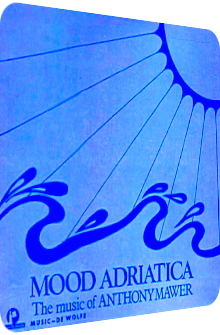
Anthony Mawer
Mood Adriatica
1968
Mood Adriatica is a ten-track travelog album by British composer and arranger Anthony Mawer (1930–1999) and released on De Wolfe Music in 1968, a label known for its library music and longtime employer for Mawer who started composing music for the label in 1955 already. But why do these things even matter when we talk about cruddy library music, recorded for use in film productions, advertisements or related projects? Where is the aesthetic value in that? I can tell you in advance that Mood Adriatica won’t be the last album published by De Wolfe Music, for some of their 80,000+ titles are enormously great and break the chains of the library music corset in an outstanding way.
The music of British fellow Peter Reno belongs to this category, and so do Mawer’s takes. Yes indeed, the music is hastily produced, played by a collective of unnamed session musicians called the International Studio Orchestra and immediately forgotten by the composer who presumably worked on six additional projects at the same time. While the idea of an artist carving out his music with great care and in long-winded moonlit pondering sessions is a romantic one, Mawer’s music has still plenty to offer. How about this attribute: Mood Adriatica is an Exotica album. A late one, true, but still exotic. Often similar to Dominic Frontiere’s Love Eyes (1960), then moving into chintzier hillsides à la Manuel And The Music Of The Mountains, Mood Adriatica features huge brass infusions, string ensembles, delicate percussion and its signature instruments, zithers and balalaikas which astutely point to the album title. An in-depth review of library music is madness, a waste for everyone who comes across this article? Not if a work towers above the flood of similar takes. Anthony Mawer’s Mood Adriatica has its flaws, but is pleasing enough to be contestable with other Exotica works and worth a revisit even decades later.
Mountainous clefts, tramontane valleys: Mountain Journey – Dolomites aurally paints the picturesque vista of the famous mountain range and brings the listener into the titular mood adriatica. Whirling flutes, alpenhorn-fueled brass flumes and the moist glissando of angelic harps paint the needed wideness of this cinematic piece. It is library music, yes, but splendidly done. The horns are only a tad melodramatic, but otherwise retain the aeriform flow that wafts around the verdured meadows. Travel Wise is a much more electrifying, upbeat corker which bursts at the seams due to its movement. Gleefully twirling strings, show tune-compatible jingle-worthy trumpets and harmonica prongs conflate with vibraphone-interspersed string washes. I’m dead-serious: this is catchiness supreme.
While Adriatic Breeze depicts a surprisingly Folk-fueled bucolic rurality that is fueled by quasi-Alpine zithers à la the theme of The Third Man, silkened maracas, euphoniously screeching strings and their darker foils and harp helixes, it is the eponymous Mood Adriatica that functions as the expected centerpiece of the album; enormously enthralling due to its spiraling technicolor harps, mellow flute and reed washes as well majestic string buildups that remind of those Winnetou movies, it shimmers iridescently. The Exotica factor is huge, if not via the missing Latin percussion, then at least due to the vibrato of the zither and the glorifiyng haze of the strings. Swinging South closes side A with a brass-heavy stringscape that puts the percussion aorta into the limelight: castanets, maracas, cowbells, kettle drums and various sticks intensify the already sun-dappled panorama further.
Side B launches with Coastal Route, one of the best inclusions of the album due to the wildly luring harmonies of the brass sections whose languorous overtones work well with the short pizzicato segues and benign legato counterparts. The two-note double basslines round off a swinging turquoise-tinged ditty. Little Pepe follows, a picayune hybrid that injects doses of Spanish/Greek Folk music into a flute-infested arrangement. Fir-green balalaika jots become enmeshed with strings aplenty, but the all too chintzy setting turns out to be a letdown that reminds too much of German Schlager schmutz. Aqua Azzura, the longest piece of almost four minutes, visits Italian coastlines and features prominent tambourines in front of a moiré of wafting violins and a lead bass flute. Torn between dazzling midday and crepuscular twilight, this is Easy Listening par excellence.
Pastorella then comprises of unnerving vibrato tones as played on a Sicilian guitar, with only a dark acoustic guitar accompanying the bonfire scenery. It is the most minimal and progressive composition at the same time, for it later changes its textures and displays lucent strings and quavering flutes. The finale is called Spring Summer and is the expected lightweight end of an adventurous-romantic album. The strings celebrate their comeback as they gyrate in full force around double bass specks and acoustic guitara in lower regions. Sugar-sweet but not entirely cheesy, Spring Summer is the transfiguring end of a remarkable album… but hey, it’s only library music, right?
Mood Adriatica would be a fully fleshed-out Exotica album that many a composer would be proud of today if they were still alive or had witnessed the resurgence of a formerly deceased genre. But even by today’s standards and the increasingly open minds of the music-loving community which also adores the works from the outer peripheries of the genre, Mood Adriatica has a big problem written on its back sleeve: this is library music. Superbly produced, mostly enchanting, vividly arranged, but library music at the end of the day. This is but one of 80,000+ entries in the gargantuan catalog of De Wolfe Music, so how good can it really be? Quite good, as you may have guessed yourself paragraphs before!
Anthony Mawer’s sheet music is obviously orchestra string-centric, and the focus on balalaikas and zithers happens one too many times despite the fitting topic, but the scope of the production is incredibly wide, in fact as much so that the old adage “they don’t produce albums like this anymore” rings true. Majestic horns, pompous drums, solemn strings and pointillistic mountainous stringed instruments may be the signature elements on this album, but they are subordinate to the structures they help creating and make possible: melodies. Be it the blue sky mountain range on the opener Mountain Journeys – Dolomites, the faintly non-Adriatic Mexican glee on Swinging South or the reductionist prudery in Pastorella, Anthony Mawer knows a thing or two about unwritten films, as his music is tailored to these hypothetical productions. One day, De Wolfe Music will make this album officially available as a download; no-one shall tell me that the amount of 80,000+ titles shatters this hope, for I am pretty aware of this myself. But still, since all copyright issues are cleared and De Wolfe Music opens its vast archive to the public bit by bit, there are reasons to keep the faith.
Exotica Review 283: Anthony Mawer – Mood Adriatica (1968). Originally published on Nov. 16, 2013 at AmbientExotica.com.
